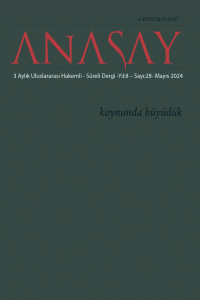Öz
Kant, bilgi alanında yaptığı devrim ile felsefenin gidişatını değiştirmiş, yeni ve farklı felsefe yapma biçimlerinin doğmasına neden olmuştur. Bir yeniliği de ahlak alanına getirmiş, Platon’dan beri süregelen mutluluk ahlakını devre dışı bırakmıştır. Kant, böylesi iki büyük devrimi gerçekleştirdiğinde insanın bölündüğünün farkına varır. Bir yanda saf teorik akıl, öte yanda tüm canlılığı ve esnekliği ile pratik akıl yer almaktadır. Bir tarafta bilimin soğukluğu, öte tarafta hayatın sıcaklığı vardır. İşte bu iki kutupluluğu ortadan kaldıracak bir bağlantıya ihtiyaç vardır. Estetik bize bu bağlantıyı verebilir ve teorik dünyayı yaşam dünyasına bağlayabilir. Estetik deneyim, güzel ilan ettiğimiz nesnelerin özel beğeni yargılarımızın üzerine kurulabileceği deneyim türüdür. Kant açısından estetik deneyim bir nesneyi gözlemlerken hissedilen zevktir. Bu makalede Kant’ın estetik deneyim kavramı araştırma konusu yapılacaktır.
Kaynakça
- Altuğ, T. (2016). Kant Estetiği. İstanbul, 3. Baskı, Payel Yayınları.
- Heimsoeth, H. (2012). Kant’ın Felsefesi. Çev. Takiyettin Mengüşoğlu, Ankara, 5. Baskı, Doğubatı Yayınları.
- Internet Encyclopedia of Philosophy, Kant, Erişim Tarihi, 21.01.2024 https://iep.utm.edu/kantaest.
- Jimenez, M. (2023). Estetik Nedir? Çev. Aytekin Karaçoban, İstanbul, Ketebe Yayınları.
- Kant, I. (1993). Arı Usun Eleştirisi. Çev. Aziz Yardımlı, İstanbul, İdea Yayınları.
- Kant, I. (2002). Ahlak Metafiziğinin Temellendirilmesi. Çev. İoanna Kuçuradi, Ankara, Türkiye Felsefe Kurumu Yayınları.
- Kant, I. (2009). Pratik Aklın Eleştirisi. Çev. İoanna Kuçuradi, Ülker Gökberk, Füsun Akatlı, Ankara, Tüürkiye Felsefe Kurumu Yayınları.
- Kant, I. (2011). Yargı Yetisinin Eleştirisi. Çev. Aziz Yardımlı, İstanbul, İdea Yayınları.
- Kneller, J. (1986). Kant’s Concept of Beauty. History of Philosophy Quarterly, Vol. 3, No. 3 (Jul., 1986), pp. 311-324, Erişim Tarihi: https://www.jstor.org/stable/27743776.
- Kula, O. B. (2008). Kant Estetiği ve Yazım Kuramı, İstanbul, Doruk Yayınları.
- Neville, M.R. (1974). Kant’s Characterization of Aesthetic Experience. The Journal of Aesthetics and Art Criticism, Vol. 33, No. 2 (Winter, 1974), pp. 193-202. Erişim Tarihi: 01.09.2023. https://doi.org/10.2307/429087 .
- https://www.jstor.org/stable/429087.
- Tunalı, İ. (2002). Estetik. İstanbul, Remzi Kitabevi.
- Wood, A.W. (2020). Kant. Çev. Aliye Kovanlıkaya, Ankara, Alfa Yayınları.
- Zimmerman, R. L. (1963). Kant: The Aesthetic Judgment. The Journal of Aesthetics and Art Criticism, Vol. 21, No. 3 (Spring, 1963) Erişim Tarihi: https://www.jstor.org/stable/427443.
Öz
Kant changed the course of philosophy with his revolution in the field of knowledge and gave rise to new and different ways of doing philosophy. He also brought an innovation to the field of morality, disabling the morality of happiness that had been in existence since Plato. When Kant realized these two great revolutions, he realized that man was divided. On the one hand, pure theoretical reason, on the other, life with all its vitality and flexibility. On the one hand there is the coldness of science, on the other the warmth of life. There is a need for a connection that will eliminate these two polarities. Aesthetics can give us this connection and link the theoretical world to the world of life. Aesthetic experience is the type of experience in which the objects we declare beautiful can be based on our judgments of special taste. For Kant, aesthetic experience is the pleasure felt when observing an object. In this article, Kant's concept of aesthetic experience will be the subject of research.
Anahtar Kelimeler
Kaynakça
- Altuğ, T. (2016). Kant Estetiği. İstanbul, 3. Baskı, Payel Yayınları.
- Heimsoeth, H. (2012). Kant’ın Felsefesi. Çev. Takiyettin Mengüşoğlu, Ankara, 5. Baskı, Doğubatı Yayınları.
- Internet Encyclopedia of Philosophy, Kant, Erişim Tarihi, 21.01.2024 https://iep.utm.edu/kantaest.
- Jimenez, M. (2023). Estetik Nedir? Çev. Aytekin Karaçoban, İstanbul, Ketebe Yayınları.
- Kant, I. (1993). Arı Usun Eleştirisi. Çev. Aziz Yardımlı, İstanbul, İdea Yayınları.
- Kant, I. (2002). Ahlak Metafiziğinin Temellendirilmesi. Çev. İoanna Kuçuradi, Ankara, Türkiye Felsefe Kurumu Yayınları.
- Kant, I. (2009). Pratik Aklın Eleştirisi. Çev. İoanna Kuçuradi, Ülker Gökberk, Füsun Akatlı, Ankara, Tüürkiye Felsefe Kurumu Yayınları.
- Kant, I. (2011). Yargı Yetisinin Eleştirisi. Çev. Aziz Yardımlı, İstanbul, İdea Yayınları.
- Kneller, J. (1986). Kant’s Concept of Beauty. History of Philosophy Quarterly, Vol. 3, No. 3 (Jul., 1986), pp. 311-324, Erişim Tarihi: https://www.jstor.org/stable/27743776.
- Kula, O. B. (2008). Kant Estetiği ve Yazım Kuramı, İstanbul, Doruk Yayınları.
- Neville, M.R. (1974). Kant’s Characterization of Aesthetic Experience. The Journal of Aesthetics and Art Criticism, Vol. 33, No. 2 (Winter, 1974), pp. 193-202. Erişim Tarihi: 01.09.2023. https://doi.org/10.2307/429087 .
- https://www.jstor.org/stable/429087.
- Tunalı, İ. (2002). Estetik. İstanbul, Remzi Kitabevi.
- Wood, A.W. (2020). Kant. Çev. Aliye Kovanlıkaya, Ankara, Alfa Yayınları.
- Zimmerman, R. L. (1963). Kant: The Aesthetic Judgment. The Journal of Aesthetics and Art Criticism, Vol. 21, No. 3 (Spring, 1963) Erişim Tarihi: https://www.jstor.org/stable/427443.
Ayrıntılar
| Birincil Dil | Türkçe |
|---|---|
| Konular | Antropoloji (Diğer) |
| Bölüm | MAKALELER |
| Yazarlar | |
| Erken Görünüm Tarihi | 1 Haziran 2024 |
| Yayımlanma Tarihi | 31 Mayıs 2024 |
| Gönderilme Tarihi | 1 Şubat 2024 |
| Kabul Tarihi | 1 Mart 2024 |
| Yayımlandığı Sayı | Yıl 2024 Sayı: 28 |


